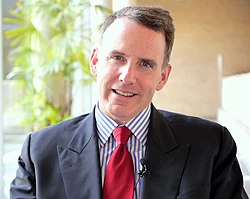Edward Glaeser | |
|---|---|
 Glaeser in 2014 | |
| Born | Edward Ludwig Glaeser May 1, 1967 New York City, US |
| Academic career | |
| Field | Economics |
| Alma mater | Princeton University University of Chicago |
| Doctoral advisor | José Scheinkman |
| Doctoral students | Jesse Shapiro Rebecca Diamond |
| Influences | Jane Jacobs Robert Lucas Gary Becker |
| Information at IDEAS / RePEc | |
Edward Ludwig Glaeser (born May 1, 1967) is an American economist who is currently the Fred and Eleanor Glimp Professor of Economics at Harvard University, where he is also the Chairman of the Department of Economics.[1] He directs the Cities Research Programme at the International Growth Centre.[2]
Born in New York City, Glaeser was educated at the Collegiate School and Princeton University, where he received his AB in economics in 1988.[3] After receiving a PhD in economics from the University of Chicago in 1992, he joined the faculty of Harvard University. He has served as the director of the Taubman Center for State and Local Government, and as the director of the Rappaport Institute for Greater Boston (both at Harvard Kennedy School).[4] He is a senior fellow at the Manhattan Institute, and a contributing editor at City Journal.[5] He also chairs the Advisory Council of the Liveable London unit at Policy Exchange.[6] Glaeser and John A. List were mentioned as reasons for which the American Economic Association began to award the John Bates Clark Medal annually in 2009.[7]
Glaeser has been a faculty research fellow at the NBER since 1993, and was an editor of the Quarterly Journal of Economics from 1998 to 2008.[3] He was elected a Fellow of the Econometric Society in 2005, and was elected to the American Academy of Arts and Sciences in 2010.[3][8][9]
According to a review in The New York Times,[10] his book Triumph of the City[11] summarises years of research into the role that cities play in fostering human achievement and "is at once polymathic and vibrant."[10] Glaeser is known for his work showing the economic and social benefits of dense and abundant housing in cities.[12]
- ^ "Edward Glaeser". scholar.harvard.edu. Retrieved 2023-10-21.
- ^ "Edward Glaeser". International Growth Centre. Retrieved 2023-12-25.
- ^ a b c Glaeser, Edward (December 2022). "Curriculum Vitae" (PDF).
- ^ "Edward Glaeser". Retrieved 17 January 2018.
- ^ "Manhattan Institute Scholar | Edward Glaeser". Archived from the original on 2014-07-02. Retrieved 2014-06-10.
- ^ The future of cities: The age of urban miracles is not over, Edward Glaeser, Thursday 18 February 2021 6:00 am, City A.M.
- ^ Glaeser, Edward L. (2017). Fundamental errors in the voting booth. Cambridge, Mass.: National Bureau of Economic Research.
- ^ "Current Fellows". www.econometricsociety.org. Retrieved 2024-01-22.
- ^ "Member Directory | American Academy of Arts and Sciences". www.amacad.org. Retrieved 2024-01-22.
- ^ a b Silver, Dana (February 11, 2011). "Up, Up, Up". The New York Times.
- ^ Glaeser, Edward (2011), Triumph of the City: How Our Best Invention Makes Us Richer, Smarter, Greener, Healthier, and Happier, New York: Penguin Press, ISBN 978-1-59420-277-3
- ^ Kang, Jay Caspian (2021-09-02). "Want to Solve the Housing Crisis? Build More, and Build Higher". The New York Times. ISSN 0362-4331.